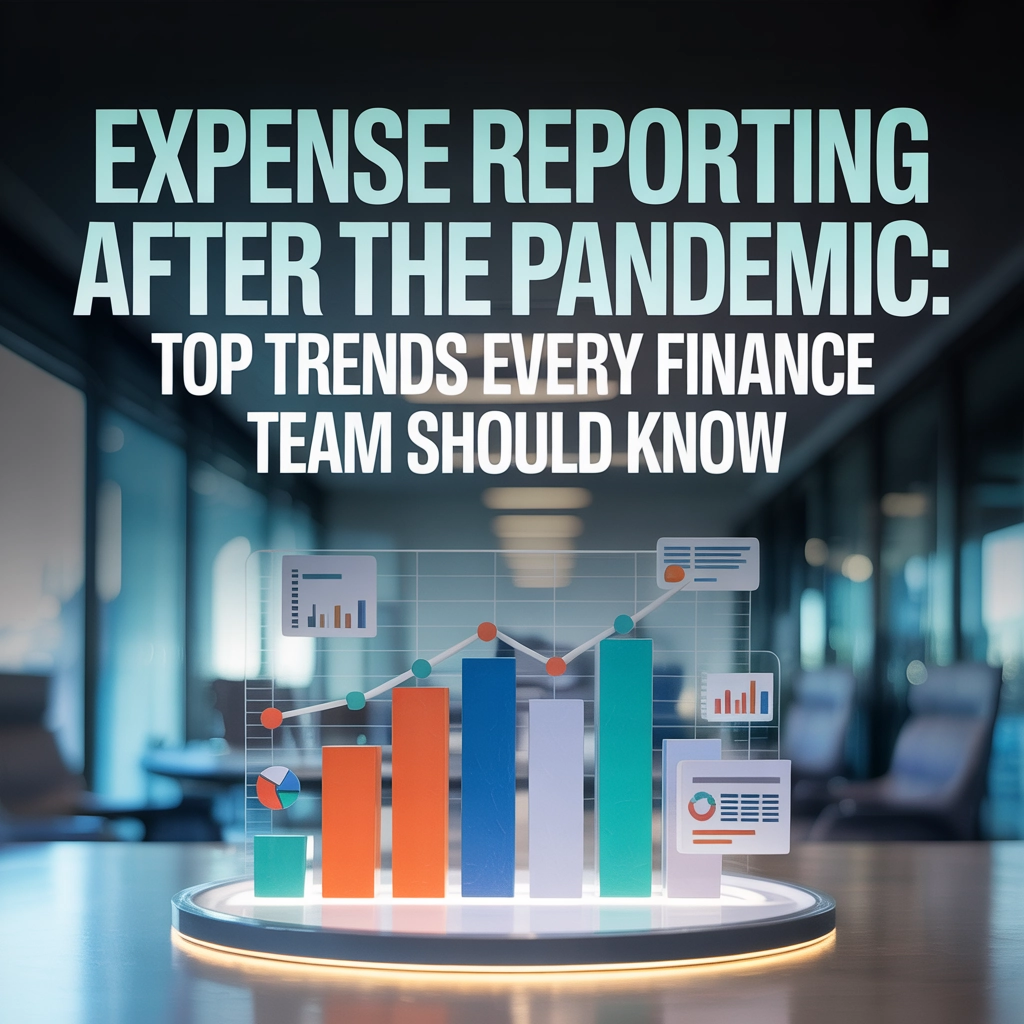
Expense Reporting After the Pandemic: Top Trends Every Finance Team Should Know

Remember when expense reports meant collecting crumpled receipts from business trips, manually entering data into spreadsheets, and chasing down approvals through endless email chains? Then the pandemic hit, and suddenly, those traditional processes seemed even more outdated as remote work became the norm overnight. Now, as we've settled into post-pandemic rhythms, finance teams are discovering that expense management has fundamentally transformed and those changes are here to stay.
Amidst the pandemic, DATABASICS swiftly emerged as a leading provider, assisting organizations in adapting to the evolving landscape. We observed a shift in expense patterns, with new trends emerging in the allocation of funds towards home office expenses and the inevitable decline in travel-related costs. As the pandemic evolved, we closely monitored the number of expense reports submitted by our customers, using it as an indicator of the economy’s recovery from the initial downturn in March 2020.
At DATABASICS, we've watched this evolution unfold in real-time, helping organizations adapt their timesheet and expense reporting systems to meet new challenges. The landscape has shifted dramatically, creating both obstacles and opportunities for finance teams looking to optimize their operations. Let's explore the top trends reshaping expense reporting in this new era and what they mean for your organization.
1. Economic Pressures Driving Strategic Expense Management
The economic turbulence of recent years has transformed expense management from a routine back-office function to a strategic priority. With inflation finally showing signs of stabilization, finance teams are now focusing on smarter approaches to cost control.
Inflation-Adjusted Policies
Finance teams are revisiting their expense policies to reflect real-world costs. Those $50 meal allowances set in 2019 might not cut it in today's economy. Modern expense reporting systems now allow for dynamic policy adjustments based on location, helping organizations stay realistic while preventing overspending.
The challenge isn't about controlling costs; it's about understanding spending patterns across departments and regions to make data-informed decisions about where to invest and where to cut back.
From Cost-Cutting to Strategic Spending
The knee-jerk cost-cutting that characterized the pandemic's early days has evolved into more nuanced approaches. Organizations are using advanced expense management tools to track spending across categories, vendors, and departments, identifying opportunities to negotiate better rates or consolidate purchases.

DATABASICS's expense reporting solution helps finance teams analyze spending patterns and identify cost-saving opportunities without compromising employee satisfaction. By automating routine approvals while flagging exceptions, the system allows finance professionals to focus on strategic analysis rather than transaction processing.
2. Remote and Hybrid Work: Transforming Travel and Expense Policies
Perhaps no area has seen more dramatic change than travel and expense policies for remote and hybrid workforces. The lines between business and personal expenses have blurred, creating new compliance challenges and opportunities.
The New Business Travel Reality
While business travel hasn't returned to pre-pandemic levels, it's definitely on the rebound. Industry analysts predict North American corporate travel spending will grow by 14-15% in 2024 and 2025. However, the nature of that travel has changed significantly.
Companies are being much more selective about when and why they send employees on trips. This means expense systems need to be smarter about capturing the business purpose and ROI of travel.
DATABASICS's expense reporting software helps organizations track not just the costs but the outcomes of business travel, enabling finance teams to evaluate which trips deliver measurable value and which might be better handled virtually.
Home Office Expenses and Stipends
Remote and hybrid work arrangements have created new expense categories that simply didn't exist for many organizations before 2020. Home office stipends, internet reimbursements, and technology allowances have become standard elements of expense policies.
Managing these new expense types efficiently requires systems designed for modern work arrangements. Our customers needed a solution that could handle both traditional travel expenses and these new remote work categories without creating separate workflows.
3. Sustainability Tracking Becoming Standard
Environmental consciousness has moved from a nice-to-have to a must-have element in expense management. Organizations are increasingly required to track and report on the carbon footprint of their business activities.
Carbon Footprint Monitoring
Advanced expense management systems now track the environmental impact of business travel, helping organizations meet sustainability goals and reporting requirements. These tools can identify lower-emission travel alternatives that align with both environmental and financial objectives.
DATABASICS's solution includes carbon footprint tracking that integrates seamlessly with expense reporting, giving finance teams the data they need to support corporate sustainability initiatives without creating additional administrative burden.
Policy Enforcement with Sustainability Guidelines
Modern expense policies increasingly include sustainability guidelines alongside traditional spending limits. This means expense management systems must be able to flag not just over-budget submissions but also options that don't align with an organization's environmental commitments.
4. Automation and AI Revolutionizing Expense Processing
The post-pandemic era has accelerated the adoption of automation and artificial intelligence in expense management, driven by the need for efficiency and the challenges of managing remote workforces.
Receipt Capture and Automatic Categorization
The days of manually entering expense data are rapidly disappearing. Today's expense solutions use AI to extract information from receipts, automatically categorize expenses, and flag potential policy violations.
Finance teams used to spend hours reviewing expense reports line by line. Now the system handles routine approvals automatically, and they only need to review exceptions. The result has their processing time by hours.
Real-Time Visibility and Reporting
The quarterly expense review has given way to real-time dashboards that provide continuous visibility into spending patterns. This shift enables finance teams to identify trends and address issues proactively rather than reactively.
DATABASICS's reporting capabilities give finance leaders immediate insight into organizational spending, with customizable dashboards that highlight key metrics and trends. This real-time visibility is particularly valuable in today's rapidly changing economic environment.
5. Integration: The Key to Comprehensive Financial Management
Perhaps the most significant post-pandemic trend is the growing emphasis on integration between expense management and other financial systems. Standalone solutions are giving way to comprehensive platforms that connect expense reporting with time tracking, project management, accounting, and ERP systems.
Timesheet and Expense Integration
For project-based organizations, the connection between time tracking and expenses is particularly critical. Integrated solutions allow costs to be properly allocated to projects, clients, or grants, supporting accurate billing and financial reporting.

DATABASICS's integrated timesheet and expense reporting solution ensures that all project costs, both labor and expenses, are captured and allocated correctly, providing a complete financial picture for each project or client engagement.
ERP and Accounting System Connections
The days of manually transferring expense data to accounting systems are over. Modern expense management solutions offer seamless integration with major ERP and accounting platforms, eliminating duplicate data entry and ensuring financial consistency.
Integration isn't just about efficiency. It's about data integrity. When your expense system talks directly to your ERP, you know the numbers are consistent across all your financial reporting.
Moving Forward: Embracing the New Expense Management Landscape
As we continue to navigate the post-pandemic business environment, finance teams that embrace these trends will be better positioned to support their organizations' strategic objectives while maintaining appropriate controls and compliance.
The most successful finance departments are treating this period not as a return to pre-pandemic norms but as an opportunity to reimagine expense management for the future of work. By leveraging modern tools like DATABASICS's integrated time and expense solutions, they're turning what was once viewed as an administrative burden into a source of strategic insight.
For finance teams looking to stay ahead of these trends, now is the time to evaluate whether your current expense reporting processes and systems are equipped to handle the new realities of business spending. The right solution should offer the flexibility to adapt to evolving policies, the automation to improve efficiency, and the analytics to support strategic decision-making.
To learn more about how DATABASICS can help your organization navigate the changing expense management landscape, visit our website or request a demo to see our integrated time and expense solutions in action.
Subscribe to our blog
Recent Posts
Posts by Topics
- Expense Management Software (129)
- DATABASICS (69)
- Time Tracking Software (47)
- Leave Management System (26)
- P-Cards (9)
- Home Healthcare (8)
- Government Contractors (7)
- Nonprofit Organizations (7)
- International Development (6)
- Receipt Management (6)
- Advanced OCR (2)
- CROs (2)
- Staffing Agencies (2)
- Vendor Invoice Management (2)
- Audit Management Software (1)
- Construction (1)
- Field Service Management (1)
- Integration (1)
- Microsoft Dynamics (1)
- Oracle NetSuite (1)
- Partnerships (1)
- Professional Services (1)
Read on

Enhancing Employee Experience with Mobile Expense Management
Read Now
Maintaining Compliance with Mobile Expense Management Tools
Read NowSeamless Integration of Time Tracking and Payroll
Read Now
Seamless Migration from Nexonia: Unified Time and Expense Solutions
Read Now
Nexonia Migration: The Best Alternative for Timesheets & Expense Management
Read Now
Subscribe to Our Blog
Subscribe to our blog and get the latest in time tracking and expense reporting news and updates.
